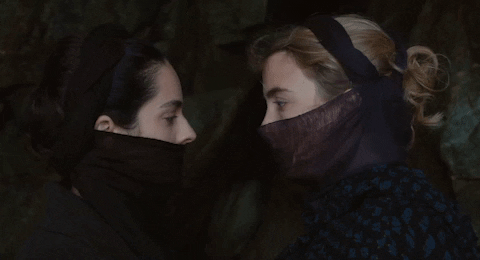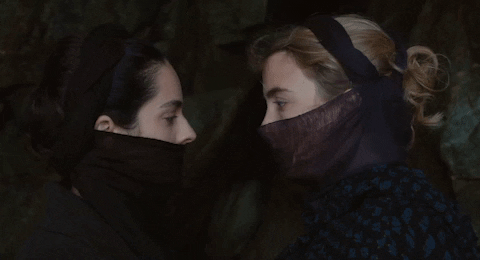I'm in love! I'm not in love! I'm crazy! I'm not crazy!
-Anacreon
Hi Lovely Humans!
In honor of February and the dreaded holiday, Valentines Day, I’ve made a playlist of ‘torch songs.’ What is a torch song you might ask? Well, according to my friend Wikipedia:
“A torch song is a sentimental love song, typically one in which the singer laments an unrequited or lost love, either where one party is oblivious to the existence of the other, where one party has moved on, or where a romantic affair has affected the relationship. The term comes from the saying, "to carry a torch for someone", or to keep aflame the light of an unrequited love.”
So here’s my contribution to the genre. Full disclosure I am a cheeseball and this playlist may or may not include Cher, Phil Collins, and Heart. Listen at your own peril :)
Also— I have some poetry forthcoming in Issue II of The Thalweg. Pre-order if you’re so inclined. All profits are split evenly among artists <3
Okay, and now to the History of Love :)
To Reach is to Love
*the podcast is the abridged version of what follows: a deep dive into four writers and thinkers. If you don’t have time, just listen to the recap.
When I was seventeen I started my freshman year of college. That same year the city of Chicago was making a bid for the Summer Olympics and every museum was free. So, instead of spending my spare time on campus where I felt lonely and disoriented, I rode the Metro North line into the city any chance I could. I'd sit in the stairwell in the modern art wing of the Art Institute of Chicago and stare at Georgia O'Keeffe’s Sky Above clouds for over an hour, hoping, I too, would dissolve into blue.
When I took the L train around the loop I stared through the glass at window after lighted window—each a block of yellow cut against the night. I could make out the shapes of humans. Beings without gender or form. I remember watching those bodies in the windows and being filled with a palpable existential terror. I pulled my knees to my chest and let the panic flood me. The fact that there could be so many brains, so many bodies that I would never know, never meet but who, nevertheless would wake the next day in rooms I would never see, speak with voices I would never hear, was an understanding beyond my imagination. How could I be surrounded, overwhelmed by the bodies of others and yet never, not once, expand beyond my own? The knowledge of how much was out there for me to know was instantly met with the impossibility of such knowledge. The only mind, the only skin I'd ever live within, was my own. Panic soon gave way to hunger. The impossibility of true understanding made me ravenous for it.
Some of you have been wondering, why romantic love? And this is the answer: when I fell in love for the first time—I mean real, generous love, not love for utility or pleasure, but love for the sake of other person—this existential horror returned in force. How could it be possible to love someone and never know them?!?!?! But when I spoke to friends and acquaintances about this fear I mostly received confused stares and therapist recommendations. So, I did what I always do when I feel most alone: make like Hermione (also a Virgo) and head to the library. I wanted to know if there was even one single person in the history of the earth who felt that the more they loved the more they understood how completely and utterly alone they were.
It turns out, I am not alone in my aloneness.
So, I lied to you. I’m not going to give you all the History of Love Part 2. I’m just another dude with an agenda—muahahahahhahaha!
If I wanted to provide a true History of Love Part 2 I’d have to talk about Shakespeare (who I love, yes, but there’s so much out there about Shakespeare already) and Freud (who I don’t love and don’t care to spend any time discussing) among many, many others.
Instead of the History of Love Part 2, I’m going to address the question that brought me to the study of romantic love in the first place: why do we engage in romantic partnerships?
This is my answer:
We seek romantic partnerships out of an inherent existential separateness.
Love is essential to human life.
By engaging in the act of love we can come as close as possible to the oneness we seek.
In order to make this argument I’m going to show how the Greeks first articulated this existential separateness. Then I’m going to speak about the Romantic period and how Mary Shelley and John Keats show that despite our inherent separateness human connection is essential to human life. Then, I’m going to demonstrate how philosopher Erich Fromm believes we can engage in the action of love and achieve union.
Greeks and The Origin of Loss:
tl:dr
Man is plagued by the feeling that they’re missing an essential piece of themselves. They spend their lives trying to fill the void.
Once upon a time man was a single orb: spherical and perfect. And yet man’s perfect oneness and perfect happiness was too pure, too strong. So palpable was man’s joy that his power threatened Olympus. Zeus commanded Apollo to split each man in two. Suddenly, man was rendered separate from his perfect oneness—he’d lost the essential part of himself that made him whole. And so, man was doomed to wander the earth searching for his missing half.
This is the story that Aristophanes tells his friends at Socrates’s table. In this myth Aristophanes is saying: we are separate from that which we once had. We are missing. There is a void within, an emptiness we seek to fill.
One could argue that this is where the origin of humankind’s belief in their existential separateness began: in Plato’s Symposium and around Socrates’s table. It was here that a few key ideas were first articulated:
Humankind feels as if there is a void, a missing piece within them
You cannot desire what you already have
Once you have what you desire, you will no longer desire it
Therefore, desire is lack
Or, more accurately, desire is the space between what you want and what you have
This could sound negative but it’s not. What the ancient Greeks are trying to establish through their dialogues is that love is knowledge. We always want to know more and there is always more to know (if you are confused about this, refer to the History of Love, Part 1).
Everything cannot be made clear to a single person—there is always the reach for more.
Anne Carson delves deeply into this concept in her essay, Eros: The Bittersweet.
The word Eros, Carson explains, is in and of itself a paradox. Both bitter and sweet in one. “In Greek the word Eros denotes ‘want’, ‘lack’, ‘desire for that which is missing’. The lover wants what he does not have. It is by definition impossible for him to have what he wants if, as soon as it is had, it is no longer wanting.”
The crux of Carson’s argument is her belief that the Greeks demonstrate that it is through love and the act of loving that we come to understand our own edge—the place where our self ends and the world begins. Without encountering another body to love and cherish we would never truly understand the limitations of this form.
“Eros is an issue of boundaries. He exists because certain boundaries do. In the interval between reach and grasp, between glance and counter glance, between ‘I love you’ and ‘I love you too,’ the absent presence of desire comes alive… The main inevitable boundary that creates Eros: the boundary of flesh and self between you and me. And it is only, suddenly, at the moment when I would dissolve that boundary, I realize I never can.”
The Romantics, Human Connection and Negative Capability
tl:dr
Romantic love is, at its heart, human connection. And human connection is essential to human life.
We call romantic love “Romantic” love because of the Romantic period. The Romantic period was an artistic movement that originated in Europe at the end of the 1700’s and lasted until approximately 1850. What makes the Romantic era unique was its study of emotion and the individual. For the purposes of this newsletter, I am going to talk about two Romantics: Mary Shelley and John Keats.
Mary Shelley:
tl:dr
Mary Shelley wrote Frankenstein which is a testament to the innate human need for connection. Through her allegory she declares that when we’re alone and rejected from our community we make monsters of ourselves and if we subject another creature to a loveless existence, we too, become monsters. Love is essential to being alive.
She was an incredible and unique woman. When I think about all my fears and my desire to conform I just have to think about this brilliant person who wrote one of the greatest books of all time at age seventeen and remember to be the pioneer of my own fucking life—if Mary Shelley could break free of convention in 1818, what am I waiting for?!?!!
Brief bio:
She was the daughter of Mary Wollstonecraft a prominent feminist and proponent of free love. Wollstonecraft had several lovers and only married Mary’s father when Mary Shelley was conceived. Mary Shelley met her future husband, the poet Percy Shelley, when she was sixteen. He was already married at the time but Mary and Percy eloped! There was a great meeting of the minds. Percy wanted their relationship to be open, as we would call it now, and they tried it out. For a while Mary was involved with both Lord Byron and Percy Shelley but that wasn’t really her style. Percy was definitely what I would call a rake and women fell in love with him and/or he seduced them. Both Mary’s younger sister and Percy’s first wife committed suicide out of desire/pain/longing for him.
Frankenstein is, perhaps, an investigation into this loss and the responsibility that Mary felt she and Percy had for the deaths of her sister and his first wife. Ultimately, Frankenstein is about the fundamental need for human connection and the belief that without connection we make monsters of ourselves. The monster in Frankenstein is not the nameless creation, but the master, Frankenstein himself. It’s a truly chilling examination of what happens when we strip our fellow humans of their ability to connect, of their ability to love, and the cruel transformation of a person forced to live without love.
I, the miserable and the abandoned, am an abortion, to be spurned at, and kicked, and trampled on.
-Frankenstein’s creature
John Keats:
tl:dr
Coined the term “negative capability” which roughly means that through the annihilation of self and the search for many truths we can hope to enter the eternal mystery but can never hope to define it.
Brief Bio:
Talk about a traumatic childhood. When Keats was eight his father died in an accident. His mom remarried and left only to return when Keats was fourteen. Keats cared for her while she died of tuberculosis. Later his younger brother also caught tuberculosis and Keats cared for him as he died. Woof.
His friend, poet Charles Brown said of Keats: “From his earliest boyhood he had an acute sense of beauty, whether in a flower, a tree, the sky, or the animal world; how was it that his sense of beauty did not naturally seek in his mind for images by which he could best express his feelings?”
Keats is not only famous for his poetry but also for his love of Fanny Brawne—a relationship that’s been preserved by his letters to her. Keats was poor and financially dependent on others when he fell in love with Brawne and so they were unable marry. Despite the limitations of their courtship, the affair lasted three years until Keats died at twenty-five. While it was by all accounts unconsummated (which honestly feels tragic to me, I don’t know why that hits me so hard, but so sad! To love someone so much and so fully and never be able to feel their touch—devastating), it was clearly a passionate and deeply feeling relationship that inspired his great odes.
In her book, Keat’s Odes, Anahid Nersessian says “The best poets, Keats says are ‘camelion’: they change to match their surroundings, sometimes entering fully into the psychic and sensational orbit of other beings. Keats gave this talent a name: it was negative capability and he had it to spare. ‘When I am in a room with people, the identity of every one in the room begins to press upon me so that I am in a very little time annihilated…’”
Keats believes that in order to truly love and in order to create art there must be an annihilation of self.
The boundary between one and the other needs to blur. You need to take in that which surrounds you and make it part of you.
It is not a single answer that art and love seek but many—an entire world of feeling and emotion is required for someone to begin to truly understand.
Keats wrote in a letter to Fanny Brawne, “You have absorbed me. I have a sensation at the present moment as though I was dissolving.”
Anne Carson speaks about this in her essay, Eros the Bittersweet. “In Greek the act of love is a mingling. Desire melts the limbs. Boundaries of body, categories of thought, are confounded…Sophocles compares the experience of eros to a lump of ice melting in warm hands.”
So—Keats is with the Greeks—in order to love we need to melt, dissolve, lose our form and join with the other and the world. Even though there is an essential, impregnable boundary between self and other we must reach across the void. Not because we seek truth or certainty but in order to find Beauty.
The Romantics remind us that even during the dawn of the individual, human connection was seen as essential for existence.
Erich Fromm and Art of Love
tl:dr
Love is an action performed daily and it can bring us into the sense of oneness we crave. Without such oneness we literally go insane.
Brief Bio:
Born in 1900, Fromm fled the Nazi’s and settled in the United States. He’s described as a social psychologist but he is also a philosopher.
Fromm’s basic philosophy of love can be summed up as follows:
1. We are driven to love because we inherently understand that we are separate from the world and if we don’t love, we will go insane.
“Any theory of love must begin with the theory of man, of human existence… When man is born… he is thrown out of a situation which is definite… into a situation which is indefinite, uncertain and open... Man is gifted with reason; he is life being aware of itself… This awareness of himself as a separate entity, the awareness of his own short life span, of the fact that without his will he is born and against his will he dies, that he will die before those whom he loves or they before him, the awareness of his aloneness and separateness, of his helplessness before the forces of nature and society, all this makes his separate, disunited existence an unbearable prison. He would become insane could he not liberate himself from this prison and reach out, unite himself in some form or other with men, with the world outside.”
“The deepest need of man, then, is the need to overcome his separateness and leave the prison of his aloneness.”
2. There are many ways humans try to overcome their intense feelings of separateness:
Orgiastic union
Since the beginning of time humans have engaged in orgiastic rites to overcome the feeling of separateness—but the sexual orgasm is transitory. It can’t really overcome separateness because it fades. But humans seek orgasms or similar pleasures w/ alcohol and drugs in order to have that momentary escape from feeling so alone.
“One way of achieving this aim lies in all kinds of orgiastic states. These may have the form of an auto-induced trance, sometimes with the help of drugs… In a transitory state of exaltation the world outside disappears, and with it the feeling of separateness from it.”
“It becomes a desperate attempt to escape the anxiety engendered by separateness, and it results in an ever-increasing sense of separateness, since the sexual act without love never bridges the gap between two human beings, except momentarily.”
Conformity
As civilization has gone on humans seek to become one by conforming. If we are like everyone else, then we will be less alone! If we pursue the same goals: marriage, pursuit of material things etc… then we will forget we are separate. But that isn’t enough.
Mature Love (the only true way to overcome separateness according to Fromm)
In order to engage in true love you have to maintain your individuality and integrity
“In contrast to symbiotic union, mature love is union under the condition of preserving one’s integrity, one’s individuality. Love is an act of power in man; a power which breaks through the walls which separate man from his fellow men, which unites him with others; love makes him overcome the sense of isolation and separateness, yet it permits him to be himself, to retain his integrity. In love the paradox occurs that two beings become one and yet remain two.”
True love is not exclusive—while you might only share in erotic love with one person, you cannot truly love one person if you do not also share love for all of humanity
True love is an action
True love is the only way to achieve union
True love is essentially an act of generosity
The ultimate “act” of generosity is that of sharing yourself. If you are not generous with your true self you cannot really be said to love
Because love is an act, it can never be “arrived at” instead it is a constant process, a practice, like the artist’s practice, that must be engaged with every day
“Love is an action, the practice of human power, which can be practiced only in freedom and never as a result of a compulsion… In the most general way the active character of love can be described by stating that love is primarily giving, not receiving.”
“The most widespread misunderstanding is that which assumes that giving is ‘giving up’ something, being deprived of, sacrificing… Giving is the highest expression of potency. In the very act of giving, I experience my strength, my wealth, my power… What does one person give to another? He gives himself, of the most precious he has, he gives up his life. This does not necessarily mean that he sacrifices his life for the other— but that he gives him of that which is alive in him; he gives him of his joy, of his interest, of his understanding, of his knowledge, of his humor, of his sadness… In thus giving of his life, he enriches the other person, he enhances the other’s sense of aliveness by enhancing his own sense of aliveness.”
“Love… is a constant challenge; it is not a resting place, but a moving, growing, working together… two people experience themselves from the essence of their existence, that they are one with each other by being one with themselves, rather than fleeing from themselves.”
3. There is a lack of love in the western world because of capitalism
Because we’re constantly pursuing material goods we aren’t engaged in any pursuits that feed the generous act of love.
“Our whole culture is based on the appetite for buying, on the idea of a mutually favorable exchange. Modern man’s happiness consists in the thrill of looking at shop windows, and then buying all that he can afford to buy… He looks at people in a similar way… Two persons thus fall in love when they feel they have found the best object available on the market considering the limitations of their own exchange values.”
“People capable of love, under the present system, are necessarily the exceptions; love is by necessity a marginal phenomenon in present day western society.”
In Conclusion
Human beings are fucking alone. We are isolated by our very minds and bodies. But just because I can never truly know another doesn’t mean I shouldn’t reach for them.
Like Aristotle says— “all men by their very nature reach out to know.”
Just because we’ll never read all the books, watch all the films, learn the history of the earth, doesn’t mean we shouldn’t try to understand all we can.
So it is with Love.
Love lives in the space between me and you as we reach through.






















Share this post